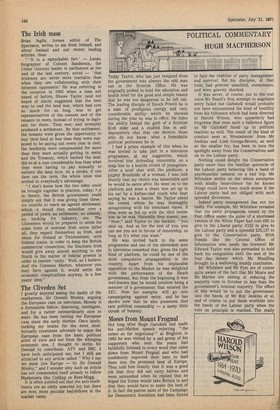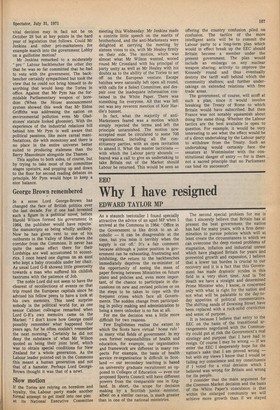POLITICAL COMMENTARY HUGH AlACPHERSON
Teddy Tay or, who has just resigned from the government was always the odd man out in the Scottish Office. He was originally picked to hold the education and health brief for the good and simple reason that he was too dangerous to be left out. The leading disciple of Enoch Powell he is a man of prodigious energy and very considerable ability which he showed during the year he was in office. He hides the ability behind the garb of a Scottish Kirk elder and a studied line in selfdeprecatory chat that can deceive those who do not know what a formidable political performer he is.
I had a prime example of this when he was invited to take part in a television programme, at my suggestion, which involved him defending censorship on a soap box to a hostile crowd of youngsters. After a brief chat with the producer, a pygmy Brunhilde of a woman, I was told bluntly that my choice was lamentable and he would be eaten alive. He went on to the platform and soon a chant was set up in his ear by a kaftan-clad youth who kept saying he was a fascist. Mr Taylor asked the crowd, whom he was thoroughly antagonising with his trenchant views, if they were as fed up with the idiot beside him as he was. Naturally they roared, yes. "Now," said Taylor to the heckler, "you shut up. And as for the rest of you, you can see you are in favour of censorship, so long as it's what you want."
He was invited back to the same programme and one of the shrewdest men in television remarked that, given the right kind of platform, he could be one of the most compulsive propagandists in the country. Apart from his implacable opposition to the Market he was delighted with the performance of the Heath government. But from the beginning it was well-known that he would swallow being a member of a government that entered the EEC. Now his energies will go into campaigning against entry, and he has shown now that he also possesses that rare political commodity — a nasty little streak of honesty.
Moses from Mount Frognal
Not long after Hugh Gaitskell had made his anti-Market speech rejecting "the terms so far negotiated " at Brighton in 1962 he was visited by a sad group of his supporters who over the years had faithfully listened to every word that came down from Mount Frognal and who had confidently expected their hero to lead them into the promised land of Europe. They told him bluntly that it was a good job that they did not carry knives and were astonished when he replied that he hoped the Tories would take Britain in and that they would have to make the best of it. In fact the patron saint of the Campaign for Democratic Socialism had been forced to face the realities of party management and survival. But his disciples, at that time, had pristine unsullied, consciences, and were gravely shocked.
It was never, of course, put to the test since Mr Heath's first attempt to negotiate entry failed but Gaitskell would probably not have encountered the kind of hostility from his followers which had been directed at Harold Wilson, who apparently had forgotten that even such a hallowed figure as Mr Gaitskell faced up to political realities as well. The result of the kind of conduct seen at Westminster from Mr Jenkins and Lord George-Brown, as well as the smaller fry, has been to turn the spotlight away from the Conservatives and on to the Labour party.
Nothing could delight the Conservative party more than the familiar spectacle of the Labour party behaving like a band of psychopathic sumarai on a bad trip. Mr Whitelaw smiles on the whole enterprise with kindly benevolence for he knows things could have been much worse if the Labour party had not obliged with such splendid diversions.
Indeed party management has not too badly. For example, Mr Whitelaw revealed that the party propaganda issued by the Post Office under the guise of a shortened version of the White Paper had cost £95 to give to the Liberal party; £152 to give to the Labour party and a splendid £25,137 to give to the Conservative party. With friends like the Central Office of Information who needs the brewers? Mr Edward Taylor was also persuaded to hold back his resignation until the end of the four day debate which Mr Maudling brought to a wallowing muddy conclusion.
Mr Whitelaw and Mr Pym are of course quite aware of the fact that Mr Moate and Mr Marten are aiming at reducing the majority vote in October to less than the government's nominal majority. The effect of this would be to put the government into the hands of Mr Roy Jenkins et a/, and of course to put these worthies into the hands of the Labour party when the vote on principle is reached. The really vital decision may in fact not be on October 28 but at key points in the hard year of legislation that follows. Could Mr Jenkins and other pro-marketeers for example march into the government Lobby on a guillotine motion?
Mr Jenkins remarked to a moderately " pro" Labour backbencher the other day that he was so far committed that he had to vote with the government. The backbencher certainly sympathised but took the view that he could not bring himself to do anything that would keep the Tories in office. Against that Mr Pym has the formidable Parliamentary weapon of boredom (When the House announcement system showed this week that Mr Eldon Griffiths was addressing the nation on environmental pollution even Mr Gladstones' statute looked gloomier). With the experience of the industrial relations bill behind him Mr Pym is well aware that political passions, like more carnal manifestations, die with monotony and there is no place in the entire universe better suited to producing staleness than the Barry Mausoleum alongside the Thames.
This applies to both sides, of course, but by trying to take most of the committee stages upstairs, and popping up and down to the floor for second reading debates on principle, Mr Pym would hope to keep a nice balance.
George Brown remembered
In a sense Lord George-Brown has changed the face of British politics over the last decade. For if one had invented such a figure in a political novel, before Harold Wilson formed his government in 1964, the publisher would have rejecteithe manuscripts as being wholly unlikely. Now he has given vent to one of his outbursts in the Valley of Sheol down the corridor from the Commons. It never has quite the same effect there for their Lordships are well accustomed to eccentrics. I once heard one digress on an aunt who kept a baby crocodile under her chair. As usual Lord G-B showed little generosity towards a man who suffered his childish tantrums with the patience of Job.
The noble Lord did not seem to have the clearest of recollections of events on that trip round the European capitals since he advised his fellow peers to have a look at his own memoirs. This need surprise nobody in the political world for, as one senior Cabinet colleague remarked when Lord G-B's own memoirs came on the Market: " I don't know how George could possibly remember what happened four years ago, for he often couldn't remember the next morning." Certainly he did not deny the substance of what Mr Wilson quoted as being their joint brief, which was to obtain special conditions for New Zealand for a whole generation. As the Labour leader pointed out in the Commons this meant a human generation and not that of a hamster. Perhaps Lord GeorgeBrown thought it was that of a newt.
Slow motion
If the Tories are relying on boredom and loyalty, the_ Labour party made another formal attempt to get itself into one piec at its National Executive Committee meeting this Wednesday. Mr Jenkins made a contrite little speech on the merits of brotherhood, and the anti-Marketeers were delighted at carrying the meeting by sixteen votes to six, with Mr Healey firmly on their side. The motion, which was almost what Mr Wilson wanted, wooed round Mr Crossland with his principal of party unity as well as Mr Healey with his doubts as to the ability of the Tories to set off on the European venture. Escape hatches were naturally left open all round, with calls for a Select Committee, and despair over the inadequate information contained in the White Paper. There was something for everyone. All that was left out was any reverent mention of Keir Hardie's bunnet.
In fact, what the majority of antiMarketeers feared was a motion which simply rejected the terms and left the principle untarnished. The motion now accepted must be circulated to some 700 organisations, including all the constituency parties, with an open invitation to amend it. What the master tacticians — with which the Labour party abounds — feared was a call to give an undertaking to take Britain out of the Market should Labour be returned. This would be seen as offering the country confusion piled on confusion. The tactics of the more intelligent antis will be to commit the Labour party to a long-term plan which would in effect break up the EEC should Britain become a member under the present government. The plan would include an embargo on any nuclear weapon sharing; activity to improve the Kennedy round and thus eventually destroy the tariff wall behind which the community shelters; and further undertakings on extended relations with free trade areas.
The government, of course, will scoff at such a plan, since it would involve breaking the Treaty of Rome to which Britain would have subscribed. But then France was not notably squeamish about doing the same thing. Whether the Labour tactics are the best available is open to question. For example, it would be very interesting to see what the effect would be of a direct undertaking by the Labour party to withdraw from the Treaty. Such an undertaking would certainly face the senators at Westminster with the constitutional danger of entry — for is there not a sacred principle that no Parliament can bind its successor?











































 Previous page
Previous page